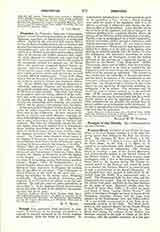

Precious Blood, the blood of our Divine Savior. Jesus, at the Last Supper, ascribes to it the same lifegiving power that belongs to His flesh (see Eucharist). The Apostles, St. Peter (I Peter, i, 2, 19), St. John (I John, i, 7; Apoc. i, 5 etc.), and above all St. Paul (Rom., iii, 25; Eph., i, 7; Hebr., ix, x) regard it as synonymous with Jesus’s Passion and Death, the source of redemption. The Precious Blood is therefore a part of the Sacred Humanity and hypostatically united to the Second Person of the Blessed Trinity. In the fifteenth century some theologians, with a view of determining whether the blood shed by the Savior during His Passion remained united to the Word or not, raised the point as to whether the Precious Blood is an essential part or only a concomitant of the Sacred Humanity. If an essential part, they argued, it could never be detached from the Word; if a concomitant only, it could. The Dominicans held the first view, and the Franciscans the second. Pius II, in whose presence the debate took place, rendered no doctrinal decision on the point at issue. However, chiefly since the Council of Trent (Sess. XIII, c. 3) called the body and blood of Jesus “partes Christi Domini”, the trend of theological thought has been in favor of the Dominican teaching. Suarez and de Lugo look askance at the Franciscans’ view, and Faber writes: “It is not merely a concomitant of the flesh, an inseparable accident of the body. The blood itself, as blood, was assumed directly by the Second Person of the Blessed Trinity” (Precious Blood, i). The blood shed during the triduum of the Passion was therefore reunited to the body of Christ at the Resurrection, with the possible exception of a few particles which instantly lost their union to the Word and became holy relics to be venerated but not adored. Some such particles may have adhered and yet adhere to the instruments of the Passion, e.g. nails, scourging pillar, Scala Sancta. Several places like Saintes, Bruges, Mantua etc. claim, on the strength of ancient traditions, to possess relics of the Precious Blood, but it is often difficult to tell whether the traditions are correct. Viewed as a part of the Sacred Humanity hypostatically united to the Word, the Precious Blood deserves latreutical worship or adoration. It may also, like the Heart or the Wounds from which it flowed, be singled out for special honor, in a way that special honor was rendered it from the beginning by St. Paul and the Fathers who so eloquently praised its redeeming virtue and rested on it the Christian spirit of selfsacrifice. As Faber remarks, the lives of the saints are replete with devotion to the Precious Blood. In due course of time the Church gave shape and sanction to the devotion by approving societies like the Missionaries of the Precious Blood; enriching confraternities like that of St. Nicholas in Carcere, in Rome, and that of the London Oratory; attaching indulgences to prayers and scapulars in honor of the Precious Blood; and establishing commemorative feasts of the Precious Blood, Friday after the fourth Sunday in Lent and, since Pius IX, the first Sunday of July.
—J. F. SOLLIER.
FEAST OF THE MOST PRECIOUS BLOOD.—For many dioceses there are two days to which the Office of the Precious Blood has been assigned, the office being in both cases the same. The reason is this: the office was at first granted to the Fathers of the Most Precious Blood only. Later, as one of the offices of the Fridays of Lent, it was assigned to the Friday after the fourth Sunday in Lent. In many dioceses these offices were adopted also by the fourth Provincial Council of Baltimore (1840). When Pius IX went into exile at Gaeta (1849) he had as his companion the saintly Don Giovanni Merlini, third superior general of the Fathers of the Most Precious Blood. Arrived at Gaeta, Merlini suggested that His Holiness make a vow to extend the feast of the Precious Blood to the entire Church, if he would again obtain possession of the papal dominions. The pope took the matter under consideration, but a few days later sent his domestic prelate Jos. Stella to Merlini with the message: “The pope does not deem it expedient to bind himself by a vow; instead His Holiness is pleased to extend the feast immediately to all Christendom“. This was June 30, 1849, the day the French conquered Rome and the republicans capitulated. The thirtieth of June had been a Saturday before the first Sunday of July, wherefore the pope decreed (August 10, 1849) that henceforth every first Sunday of July should be dedicated to the Most Precious Blood.
ULRICH F. MUELLER


